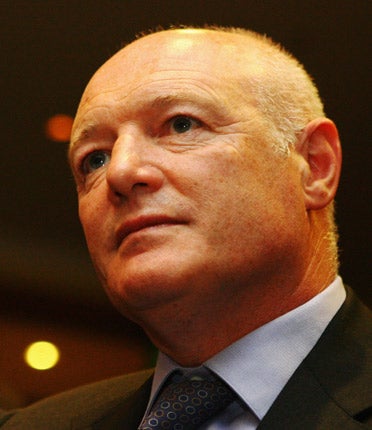Glenn Moore: A great salesman, not a football man
Departing chief executive understood business but not soul of the game

Your support helps us to tell the story
From reproductive rights to climate change to Big Tech, The Independent is on the ground when the story is developing. Whether it's investigating the financials of Elon Musk's pro-Trump PAC or producing our latest documentary, 'The A Word', which shines a light on the American women fighting for reproductive rights, we know how important it is to parse out the facts from the messaging.
At such a critical moment in US history, we need reporters on the ground. Your donation allows us to keep sending journalists to speak to both sides of the story.
The Independent is trusted by Americans across the entire political spectrum. And unlike many other quality news outlets, we choose not to lock Americans out of our reporting and analysis with paywalls. We believe quality journalism should be available to everyone, paid for by those who can afford it.
Your support makes all the difference.Peter Kenyon might be said to epitomise Oscar Wilde's epigram, "A man who knows the price of everything and the value of nothing". By his own lights he has been a very successful marketer raising the global brand awareness, and income, of Umbro, Manchester United and Chelsea. For these achievements he achieved the unique distinction of being the only chief executive to be simultaneously abused by fans of both clubs at a game, a United-Chelsea match at Old Trafford in 2004.
How ungrateful, he might say. But while Kenyon had a key role in negotiating lucrative shirt deals such as Vodafone's with United, and Samsung's with Chelsea, he found it much harder to communicate with the bread-and-butter fan. His desire to "monetise" the "customer base" grated with supporters who despite regular price rises increasingly felt the fan in the stadium meant less to their chief executive than the one in Beijing, Moscow or Los Angeles, following the team over the Internet.
Which was true. To sustain the spending required to challenge for the Champions League both clubs have to look way beyond their traditional support.
Had all this been done quietly, anonymously, Kenyon would not have provoked such hostility. However, by circumstance or choice he has been a regular in front of the cameras, and he has often made a fool of himself when doing so. There has been the annual assertion, only recently dropped in the face of continuing mountainous losses, that Chelsea would break even as a business by the end of this season. Then there was the boast that the Premier League winners would come from "a small group of one", followed by the demand for two Champions League successes in six years. He has said he wants Chelsea "to own London" in terms of support and will "turn the world blue". Only this month Kenyon insisted, "I think we can win everything," thus putting Carlo Ancelotti on notice that a quadruple was expected.
Before all this, of course, he declared that joining Manchester United was a dream come true for a lifelong fan, a love which began when his electrician father took him to Wembley to watch United lift the European Cup in 1968. He was such a fan that he walked out on Old Trafford when Roman Abramovich called, precipitating that uncomfortable afternoon of abuse, sitting alongside his own teenage son.
Kenyon, 55, had joined United in 1996 from Umbro, where the trained accountant from Stalybridge started as operations director in 1986, rising to chief executive. In that time Umbro went from a loss-making sportswear company to a profitable brand with turnover rising from £16m to £600m. He spent time in America where he absorbed much of their marketing approach.
At United he cultivated relationships with agents such as Pini Zahavi and Jorge Mendes and accelerated United's growth to become, in his words, "the single largest sports franchise in the world". But he was unpopular, notably angering fans when he took the words "football club" off the team badge.
Then he went, unexpectedly, to Chelsea, immediately alienating their supporters by briefing against the popular Claudio Ranieri. The initial distrust of "the Manc in a suit" has never dissipated, rising anew after the 2008 European Cup final when Kenyon – 40 years after cheering on United against Benfica in the final – led Chelsea up the steps in Moscow and allowed Michael Platini to hang a loser's medal round his neck.
He has done some good things at Chelsea, and not just in the corporate arena. The Cobham training complex is impressive, especially measured against its shabby rented predecessor. The club may talk up its charity work but it does take it seriously. However, Kenyon has been accident-prone, from the tapping-up of Sven Goran Eriksson and Rio Ferdinand to the controversial signings of Ashley Cole and Gaël Kakuta – although the latter, like the failing academy, should perhaps be laid at Frank Arnesen's Teflon door. The bottom line, however, remains written in red ink. In the five years under his command Chelsea made £440m in pre-tax losses.
So what next? A job in football would seem to conflict with his continuing involvement at Chelsea. Outside the game? Well, one of the first websites to react to his departure yesterday was Marketing Magazine's. A salesman left Stamford Bridge yesterday, not a football man.
Join our commenting forum
Join thought-provoking conversations, follow other Independent readers and see their replies
Comments